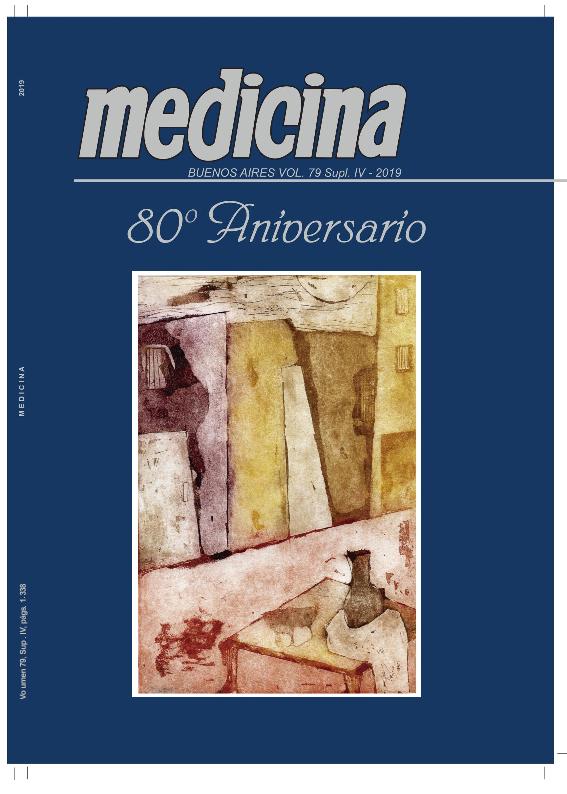Evento
Genotyping Fasciola hepatica by its1 and rapds suggests distinctive south american genetic diversity and host affinity
Scarcella, Silvana Andrea ; Bianco, Florencia; Mera y Sierra, Roberto; Neira, Gisela Natalia
; Bianco, Florencia; Mera y Sierra, Roberto; Neira, Gisela Natalia ; Solana, María Victoria
; Solana, María Victoria ; Solana, Hugo Daniel; Miranda-Miranda, Estefan
; Solana, Hugo Daniel; Miranda-Miranda, Estefan
 ; Bianco, Florencia; Mera y Sierra, Roberto; Neira, Gisela Natalia
; Bianco, Florencia; Mera y Sierra, Roberto; Neira, Gisela Natalia ; Solana, María Victoria
; Solana, María Victoria ; Solana, Hugo Daniel; Miranda-Miranda, Estefan
; Solana, Hugo Daniel; Miranda-Miranda, Estefan
Tipo del evento:
Reunión
Nombre del evento:
LXIV Reunión Anual de la Sociedad Argentina de Investigación Clínica; LI Reunión Anual de la Asociación Argentina de Farmacología Experimental; XXI Reunión Anual de la Sociedad Argentina de Biología; XXXI Reunión Anual de la Sociedad Argentina de Protozoología; IX Reunión Anual de la Asociación Argentina de Nanomedicinas y VI Reunión Científica Regional de la Asociación Argentina de Ciencia y Tecnología de Animales de Laboratorio
Fecha del evento:
13/11/2019
Institución Organizadora:
Sociedad Argentina de Investigación Clínica;
Asociación Argentina de Farmacología Experimenta;
Sociedad Argentina de Biología;
Sociedad Argentina de Protozoología;
Asociación Argentina de Nanomedicinas;
Asociación Argentina de Ciencia y Tecnología de Animales de Laboratorio;
Título de la revista:
Medicina (Buenos Aires)
Editorial:
Fundacion Revista Medicina
ISSN:
0025-7680
Idioma:
Inglés
Clasificación temática:
Resumen
The commonliver fluke Fasciola hepatica is a major cause of economic losses to agriculture all over the world, with cost estimatedat US$ 2000 million per annum, Given that the existence of genetically different populations of F. hepatica could allow, against any selection pressure, natural or artificial (for use fasciolicides products and/or control measures), one or more populations of F. hepatica to beable to survive and create resistance or adaptability to such selective pressure. It is important to characterize the different isolation of the liver fluke. The aim of the present work was to characterize genetically adult F. hepatica isolates from cattle, pigs, buffaloes and donkeys from different regions ofSouth American, using sequence analysis of ribosomal ITS1 and RAPD-PCR. Genotyping of Fasciola hepatica DNA samplesderived from, cattle, pig, buffalo, and donkey collected from different regionsof South America, were performed using the F.hepatica Internal Transcribed Spacer (ITS) sequencing, as well as RAPDs-PCR. Phylogeny assessment derived from multiple sequence alignment (MSA)of ITS sequences, exhibit a distinctive South American geographical pattern compared against F. hepatica reported ITS sequences from around the world, MSA analysis of ITS sequences also showed the F.hepatica ITS haplotypes found in south America are consistent with other reported ITS haplotypes. Further phylogenetic assessment of the electrophoresis band pattern of RAPDs-PCR amplicons, suggest the parasites genome contains markers that may reveal a host preference. Further assessment revealed twomajor F. hepatica groups within the South American isolates that clearly diverged from each other, one containing parasites obtained from swine and donkeys and other found in bovid with two additional branch subdivisions of the latter group one containing water-buffalos and a second containing only cattle.
Palabras clave:
FASCIOLA
,
ITS
,
GENETIC DIVERSITY
Archivos asociados
Licencia
Identificadores
Colecciones
Eventos(CIVETAN)
Eventos de CENTRO DE INVESTIGACION VETERINARIA DE TANDIL
Eventos de CENTRO DE INVESTIGACION VETERINARIA DE TANDIL
Citación
Genotyping Fasciola hepatica by its1 and rapds suggests distinctive south american genetic diversity and host affinity; LXIV Reunión Anual de la Sociedad Argentina de Investigación Clínica; LI Reunión Anual de la Asociación Argentina de Farmacología Experimental; XXI Reunión Anual de la Sociedad Argentina de Biología; XXXI Reunión Anual de la Sociedad Argentina de Protozoología; IX Reunión Anual de la Asociación Argentina de Nanomedicinas y VI Reunión Científica Regional de la Asociación Argentina de Ciencia y Tecnología de Animales de Laboratorio ; Mar del PLata; Argentina; 2019; 126-126
Compartir



